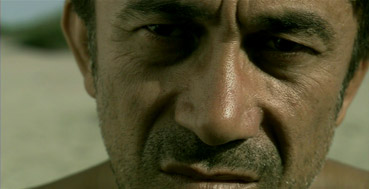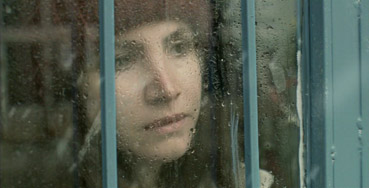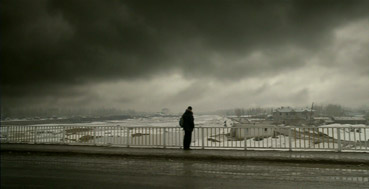|
There's
a moment in Nuri Bilge Ceylan's Climates [Iklimler] that should strike a chord with
anyone who's stayed in a failing relationship past the point
when both parties should have called it quits. Sitting outside
with friends after a dinner, middle-aged university lecturer
Isa observes that the temperature has dropped and asks his
younger girlfriend Bahar if she is cold. She tells him
she's fine, an innocuous and everyday exchange you might
think, but not for this pair. For Isa, that response is a
loaded one, a verbal face-slap that he is being dared to
respond to. It's quite possible that was how it was intended. As a result, it takes
just a minute for him to move from 'Aren't you cold?'
to 'Can't we go anywhere without you making problems?'
When couples have reached this stage, that's all it takes
to kick things off.
Climates
begins with this relationship already in its death throes.
Isa and Bahar are on holiday, a regular couple visiting historical
ruins in that way tourists do. As Isa stays to take
pictures, Bahar walks up a hill and sits down to watch him
and the we lock in on her face. When Isa falls over, she smiles, but her expression then slowly dissolves into
one of barely controlled despair. Their drive back to the
hotel is similarly suggestive, as Isa sleeps and Bahar shoots
him glances that range from amused to weary. By the time
they get to the above mentioned meal, it's clear that something
is not right between them.

If
you like your plots complex and your narratives fast moving
and packed with incident then the cinema of Turkish director
Nuri Bilge Ceylan is probably not for you. I've read a small
number of reviews of his Cannes Grand Jury Prize winner Uzak that complained about its slow place
and lack of drama, and it always seemed to me that the
reviewers in question were looking at the film without really
watching it. Ceylan tells small, personal stories in a subtle
and unhurried but arrestingly cinematic manner. In his films,
landscapes can be as expressive as faces and both are used
to telling and poetic effect, with dialogue kept to a waste-free
minimum.
This
technique is employed to particularly powerful effect in two early
scenes of Climates. In the first, the sunbathing
Bahar wakes from a bad dream (which provides a brief round-up
of the degeneration of her relationship with Isa, a touch
literal in its symbolism but effective nonetheless) and
walks down the beach to sit and stare out to sea. The gap
this places between her and Isa seems to say it all, and
it's an image that will later be recalled by a holiday brochure
photograph that may be instrumental in sending Isa in pursuit
of the then departed Bahar. As Bahar gets up to swim, it's Isa's
turn to watch and wrestle with his feelings. He even begins
to rehearse the inevitable break-up speech, which in a superbly
executed reveal switches midway to the real thing, a civilised
sounding agreement undercut by repressed resentment.
In
the scene that follows, the two are travelling by motorbike
along a cliff top road. Isa is driving, but the camera once
again locks in on Bahar, whose troubled facial expressions
and aggrieved stares at the back of her boyfriend's head
speak with a clarity that words would only make clumsy.
The sudden and unexpected culmination of this ride, which
I have no intention of revealing here, tells us a lot about
the buried sadness and anger of both, feelings that briefly
resurface as Bahar prepares to head home alone by coach
– "I'll call you when I'm back in Istanbul," Isa
offers. "Don't," is Bahar's curt reply. We're
left to decide for ourselves what the back story is to this
break-up with only the merest suggestion to guide us. Their
past is rarely discussed and never in any detail – only a
brief mention of "the Serup incident" hints at
a reason for the couple's current discord.
From
this point on it's Isa who takes centre stage, and it becomes
clear that his hesitance to end the relationship may well
have been driven by an underlying uncertainty about what
he actually wants. An attempt to re-awaken a past affair
with the aforementioned Serup comes uncomfortably close
to rape, an aggressive reassertion of his masculinity in
the face of a rejection he participated in and may now
be unsure of. When Serup later becomes the sexual aggressor,
Isa appears to have lost interest – is he now regretting
his decision or is he beginning to understand the collective
pain he may have caused Bahar?

There
are no big themes or startling revelations here, no clever
monologues for indie film fans to quote at parties, and
Isa is not an initially likeable or sympathetic main character.
And yet the experience of breaking up from a relationship
whose staleness has become painful, the uncertainty,
self-confusion and resentment that surrounds this decision,
is so accurately and vividly captured that he is always
an interesting and believable one.
The use of wide shots, landscape and seasonal extremes –
the scorching sun of the opening contrasts starkly with
inhospitable snow of later scenes – is as evocative as it
was in Uzak, but Ceylan's secret weapon
here is his increased use of facial close-ups, creating an intimacy
with the characters that transcends any problem we may have
with their behaviour or attitudes and allowing us to feel
for them and engage with their emotional state. Ceylan's
decision to cast himself and his wife Ebru in the lead roles
risks accusations of self-indulgence* but the evidence in
his favour is right up there on the screen – both he and
Ebru are models of emotional turmoil buried beneath masks
of crumbling self control, probed in close-up detail by
Gökhan Tiryaki's excellent digital camerawork, images
as richly film-like as I've seen from Hi-Def.
Climates is still going to prove too low-key for some, but in the
face of the histrionics and clichés usually associated
with such cinematic explorations of relationships in decline,
I found such restraint most welcome. I was a big fan of Uzak,
but was even more captivated by Climates,
a film of cinematic beauty and economy, of genuine and perceptive
emotional depth encased in a shell of deceptive narrative
simplicity. A few nights ago I'd just started watching it
for the second time when my girlfriend dropped in for a
brief hello and a glass of wine. She'd only intended to
stay for 20 minutes but ended up rooted to the sofa for
the rest of the film. "It's odd," she remarked,
"nothing much happens, and yet I couldn't stop watching
it." That's as tidy a summary of the film's hold as
I've encountered.
Climates
was shot on High Definition in a range of potentially problematic
lighting and weather conditions, from bright sunlight to
dimly light night interiors to bleak snowscapes, but the format copes
with all of them impressively and the transfer here does
full justice to that. Sharpness and contrast are excellent
and there is no obvious digital noise. There are a couple
of burnouts on skies, but the snow scenes are very well
captured, with none of the detail loss you might expect from
digital. The framing is aproximately 1.95:1 and
the picture is anamorphically enhanced.

The
soundtrack is Dolby 2.0 stereo only, but the intimate nature of
the story never cries out for anything more. Clarity and
dynamic range are very good throughout, and the recording
and mix create a strong sense of location and atmosphere.
Interview
with Nuri Bilge Ceylan (25:52)
A consistently interesting interview with director Ceylan
that covers most of the hoped-for topics, including the
development of the story, working with HD for the first
time ("Film is dead for me"), the locations, the
handling of the sex scene, the locations and more. He also,
inevitably, responds to the suggestions that the film was
autobiographical and expresses a preference for personal
over political films. The interview is conducted in English.
Interview
with Ebru Ceylan (14:08)
Ebru discusses the development of the project, her husband's
working methods and the experience of working with him,
her own performance and her ambitions for her own film.
Again this is useful stuff, conducted in Turkish with English
subtitles.
Making
of Climates (37:54)
A behind-the-scenes featurette that plays almost like footage
from the Sundance Channel's Anatomy of a Scene,
with the shooting of three short sequences observed in comment-free
detail, including multiple takes using different actors
on one shot that never made it to the final cut.
Trailers
are included both for Climates (1:38) and
Ceylan's earlier Clouds of May (1:07),
which is part of Artificial Eye's 2-disc set, Nuri
Bilge Ceylan – The Early Works.
Turkey
Cinemascope
A collection of strikingly composed photographs taken by
Ceylan when scouting locations for the film, which were
exhibited in the Olivier exhibition foyer at the National
Theatre to coincide with the release of this film.
Finally,
there is a Nuri Bilge Ceylan Filmography
and Ebru Ceylan Biography.
It's
taken me quite a while to write this review and its not
just because I'm overloaded with work – despite the film's
simple beauty I found it hard to get a handle on just why
it exerts such a hold and I'm still not sure I have. The
best advice I can give is to see for yourself, and though
I'm willing to bet that while you don't have to have been through
such a break-up yourself to connect to the characters the
way I did, it probably helps.
Artificial
Eye have delivered a fine DVD here, the quality of the transfer
matched by some interesting extra features. It's a personal
choice, sure, but recommended nonetheless.
|